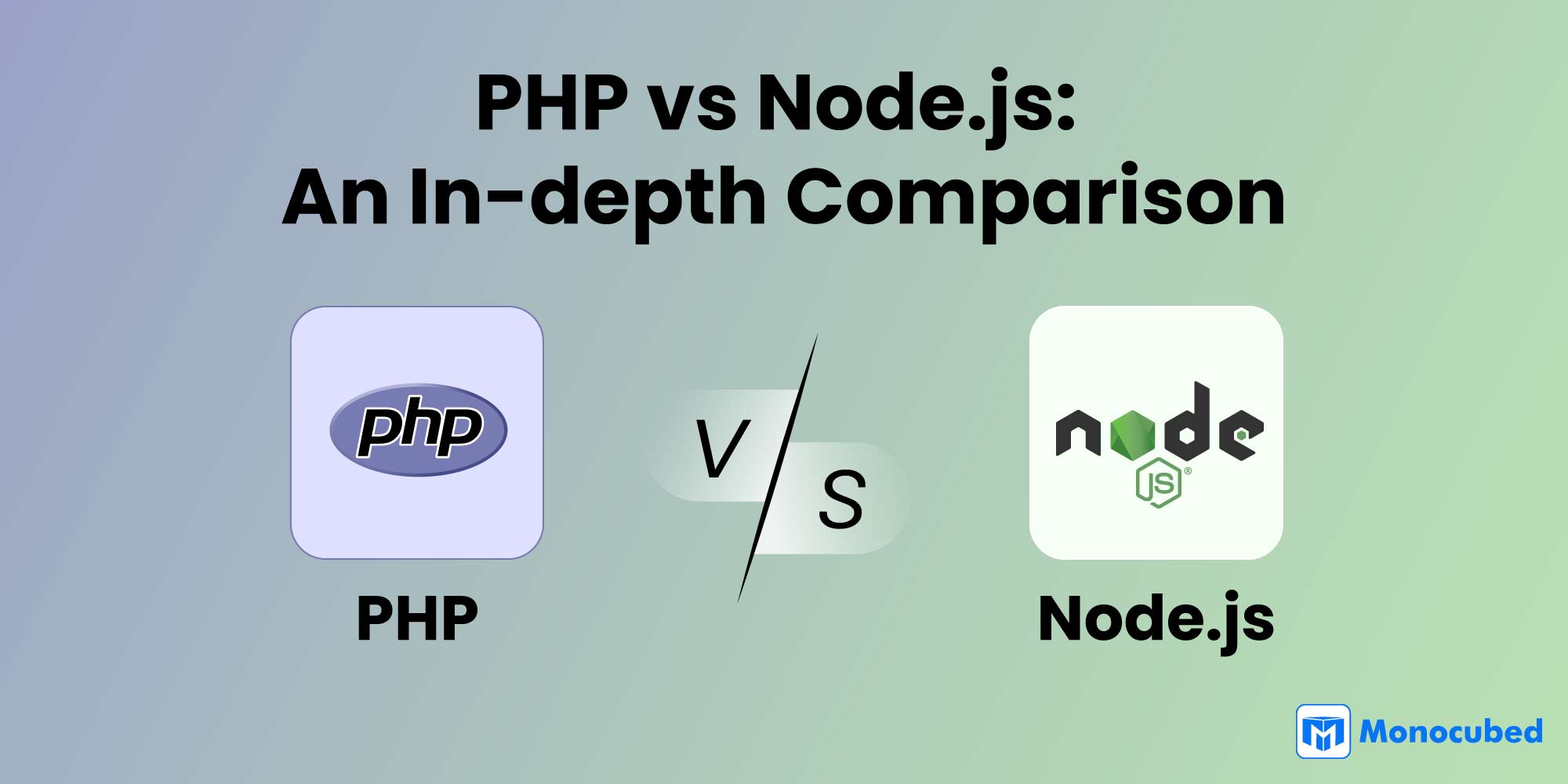PHP or Node.js – which backend technology should you use for your next web development project?
Choosing the right backend platform is helpful for building a solid website or web application. The server-side technology powers critical functions like business logic processing, database interactions, API routing, server-side rendering and more.
PHP and Node.js are two of the most popular options for server-side web development today. But these both have very different strengths and weaknesses when it comes to criteria like performance, scalability, complexity, use cases and community support.
Deciding whether to use PHP or Node.js for your next web project can be confusing, especially for those new to backend development.
As a leading web development agency, we know which aspects are important to choose a particular technology for a web project development. Therefore, based on that, we have curated this comparison guide.
Read on to get a detailed understanding of PHP vs Node.js to determine the right backend technology for your needs.
Table of Contents
What is PHP?
PHP is an open-source, server-side scripting language designed for web development. The recursive acronym for PHP stands for Hypertext Preprocessor.
Here are some key features of PHP.
- Interpreted language – PHP code is executed on the server side and does not need to be compiled first. This allows for faster development.
- Cross-platform – PHP can run on various operating systems like Windows, Linux, Unix, etc. Platform independence allows flexible deployment.
- Server-side scripting – PHP is designed for server-side scripting, so code is executed on the server and HTML is sent to the client browser.
- Embeddable – PHP code can be directly embedded into HTML code, unlike other languages like Python or Ruby. The server processes the PHP code and generates web page content.
- Extensive libraries – PHP has a large number of built-in libraries for tasks like accessing databases, generating PDFs, image manipulation, etc. This simplifies web development.
- Object oriented – PHP supports object-oriented programming, with features like classes, inheritance, interfaces, etc. This allows modular and reusable code.
- Scalability – PHP-based sites can handle high traffic volumes. Facebook uses PHP to power their platform. Caching helps with load balancing.
- Database integration – PHP provides native connections to databases like MySQL, Oracle, MongoDB, Postgres, SQLite, etc. Database operations can be done within PHP itself.
- MVC frameworks – PHP has robust MVC frameworks like Laravel, Symfony, CodeIgniter, and CakePHP, which provide structure for large applications.
What is Node.js?
Node.js is an open-source, cross-platform runtime environment for executing JavaScript code outside of a browser. Node.js is widely used for building scalable and efficient network applications, particularly web servers.
Here are key features of Node.js:
- Asynchronous, event-driven – Node.js uses asynchronous, event-driven architecture for building scalable and fast network applications. This allows handling multiple requests without blocking code execution.
- Non-blocking I/O – Node.js uses libuv library for its non-blocking I/O model. This allows other operations to execute while a previous one is waiting, making it efficient.
- Single-threaded but highly scalable – Node.js uses a single thread that supports asynchronous I/O requests. This makes it lightweight compared to traditional servers that create threads for each request.
- Cross-platform – Node.js can run across various platforms like Windows, Linux, Unix etc. This provides a lot of flexibility.
- Active open source community – Node.js has a very active community that submits new modules and frameworks through npm (node package manager). This allows faster innovation.
- Event loop – The event loop handles all async callbacks and I/O operations, allowing continuous request handling without traffic pileup.
- Very fast – Built on Google’s V8 engine, Node.js executes JavaScript code very fast and hence is suited for data-intensive real-time apps.
- No buffering – Node.js applications never buffer data. They output data in chunks received from the I/O resource.
- Lightweight – Node.js has a lightweight architecture without load balancing and other bloat, making it ideal for microservices.
- Package ecosystem – npm contains over 1 million packages that help extend the functionality of Node.js easily.
Node.js is particularly favoured for projects that require high performance and handling of multiple simultaneous connections, such as web applications with real-time functionalities, APIs, and data streaming applications. Its unified JavaScript development stack simplifies development and speeds up the web development process.
Build a Robust and Scalable Web App for Your Business
Let’s talk. We have web developers who are proficient in PHP and Node.js both the technology to build your project.
Here is a quick comparison of PHP vs Node.js.
PHP vs Node.js – A Comparison Table
Here is a comparison table of Node.js vs PHP for developing a scalable web project.
| Key Differences Between PHP and Node.js | ||
|---|---|---|
| Aspect | PHP Description | Node.js Description |
| Type | PHP is a widely-used scripting language specifically designed for web development. It processes scripts on the server and delivers the output as HTML to the client, making it ideal for creating dynamic web content. | Node.js is a versatile runtime environment that allows JavaScript to be used on the server side. This expands the capabilities of JavaScript, enabling the development of scalable network applications beyond traditional browser-based scripts. |
| Release Year | PHP was introduced in 1995 and has since established a large community. This long-standing presence has led to a vast array of tools, resources, and a robust ecosystem, beneficial for various web development projects. | Launched in 2009, Node.js introduced a new approach to web and network application development. It has quickly gained popularity for its innovative features and modern approach to handling web processes. |
| Execution Model | PHP operates on a synchronous execution model. It processes requests one after another, which can be straightforward but may lead to delays in processing simultaneous requests in high-traffic scenarios. | Node.js is built on an asynchronous, event-driven architecture. This allows it to handle multiple operations simultaneously, significantly reducing processing time and improving performance in applications with high user interaction. |
| Programming Paradigm | PHP supports a mix of programming styles – procedural, Object-Oriented Programming (OOP), and functional programming. This flexibility allows developers to choose the most suitable approach for their project. | Node.js primarily follows an event-driven programming paradigm. This makes it highly efficient for scenarios that require real-time data processing, such as chat applications or live data feeds. |
| Performance | PHP offers fast performance for a variety of web projects, including creating dynamic web pages and operating complex CMS platforms. Its speed is sufficient for standard web application requirements. | Node.js is recognized for its exceptional performance, particularly in handling multiple simultaneous connections. This makes it a top choice for applications that demand real-time interaction and high concurrency, such as interactive web applications. |
| Scaling | PHP can be scaled effectively by adding more servers and implementing load-balancing techniques. This traditional scaling approach is suitable for many standard web applications. | Node.js excels in scalability due to its non-blocking nature and features like clustering, which allow it to efficiently manage a vast number of simultaneous connections, ideal for high-traffic applications. |
| Learning Curve | PHP is known for its easy learning curve, making it an accessible choice for beginners or developers transitioning from other C-like languages. It’s a common entry point into web development. | Node.js presents a moderate learning curve, especially for those used to synchronous programming. Understanding its asynchronous nature and mastering JavaScript is key to leveraging its full potential. |
| Use Cases | PHP is best suited for traditional web development tasks such as building websites, blogs, and content management systems like WordPress. It’s a reliable choice for standard web applications. | Node.js is ideal for developing advanced web applications like APIs, microservices, and real-time applications (e.g., chat services, and live streaming). Its capabilities are well-suited for complex, interactive web projects. |
Let’s learn about the comparison of PHP vs Node.js.
PHP vs Node.js – A Detailed Comparison of Both Languages
Now that we have looked at where PHP and Node.js originated from, let us compare them across some key parameters.
-
Type
PHP is a general-purpose scripting language optimized for web development. The PHP syntax draws inspiration from C, Java, Perl, and C++. PHP code is executed on the server side by the PHP interpreter. It generates an HTML markup that is sent to the client.
Node.js on the other hand is a JavaScript runtime environment. It uses the Chrome V8 JavaScript engine to execute code outside of a browser context. Node.js runs on the server side in a non-blocking manner to handle client requests and perform I/O operations.
Winner: Node.js
Node.js represents modern application development with its asynchronous, event-driven architecture. It leverages JavaScript popularity and has proven itself for building scalable, high-performance backend services and applications.
-
Execution Model
PHP follows a synchronous execution model with a request/response architecture. When a PHP script is run, the PHP engine executes each statement sequentially in order. The engine waits for one statement to finish before moving to the next.
Node.js uses asynchronous, event-driven execution via callbacks and promises. When a Node.js server gets a request, it dispatches it to the event loop. The callbacks associated with that event get triggered but the overall application can handle other requests as well without waiting for the first one to finish.
Winner: Node.js
Node.js has a clear advantage over PHP when it comes to the execution model. The asynchronous, event-driven architecture makes Node.js faster, more efficient and more scalable compared to PHP’s synchronous request/response flow.
-
Programming Paradigm
PHP is a multi-paradigm language that supports procedural, object-oriented and functional programming styles. Beginners can start with simple procedural scripts while modular OOP is better suited for large applications.
Node.js follows the asynchronous, event-driven paradigm which makes it efficient for I/O-intensive operations. Callback functions are used extensively to handle events like incoming requests without blocking overall execution.
Winner: Node.js
The asynchronous event-driven paradigm of Node.js is better suited for today’s network-driven and real-time applications. It makes more efficient use of resources and enables highly scalable architectures.
-
Performance
PHP is good at running scripts quickly for dynamic websites. It’s suitable for websites where the content changes based on user actions or other factors. PHP processes requests one by one, which is fine for many standard websites.
However, Node.js excels in speed and efficiency, particularly for websites with lots of user interactions happening at the same time. Node.js uses asynchronous operations, meaning it can handle multiple tasks at once without waiting for each one to finish before starting the next.
This is great for real-time applications, like chat apps or online games, where you have many users connected and interacting simultaneously. Node.js can deal with all these users with less delay, making it a faster choice for such scenarios compared to PHP.
Winner: Tie
Both (Node.js vs PHP) have strengths that make them highly performant for different classes of applications. Picking a clear winner is difficult as it depends on the specific use case and optimization techniques used.
-
Scalability
PHP applications can scale up to meet higher demand by adding more servers and using a load balancer. A load balancer is like a traffic controller that distributes incoming requests to different servers so that no single server gets overloaded. This way, as more users visit a PHP-based website, more servers can be added to keep the website running smoothly.
Node.js, however, has an advantage when it comes to scalability due to its unique architecture. It uses an asynchronous single-threaded model, which means it can handle multiple tasks in a non-blocking way, even with just one thread of execution. This makes Node.js naturally efficient at using system resources.
Moreover, Node.js has features like clustering. Clustering allows a single Node.js process to create multiple copies of itself, known as forks, which can run simultaneously. This is like turning one worker into many workers, all handling different tasks at the same time. This ability to fork processes helps Node.js applications handle a lot more traffic without needing to create web servers as PHP would.
In simple technical terms, while PHP can scale well by adding more hardware, Node.js scales more efficiently due to its ability to handle multiple tasks concurrently within the same application process and its capability to create multiple processes for better throughput. This makes Node.js particularly suitable for applications that expect rapid growth or high traffic.
Winner: Node.js
Node.js has greater inherent scalability due to its event-driven, non-blocking I/O model. It scales vertically very well and can handle high concurrency with minimal resources.
-
Learning Curve
When it comes to the learning curve of PHP and Node.js, each offers a different experience, especially for beginners and web developers transitioning from other languages.
PHP, known as a server-side scripting language, is often considered one of the easiest languages for beginners to pick up, especially for those familiar with C-like languages. Its syntax is user-friendly and straightforward, making it a popular choice for creating dynamic web pages and web applications.
Beginners can quickly learn to use PHP for developing web content, thanks to its clear structure and extensive online community support. However, advancing to more sophisticated PHP projects, such as those involving PHP frameworks or complex backend development, requires a deeper understanding of the language and its ecosystem.
Node.js, representing a cross-platform runtime environment, presents a moderate learning curve. It’s particularly unique for its use of asynchronous programming, a concept that allows web applications to handle multiple tasks simultaneously, enhancing performance. This is a key aspect of software development technologies focusing on real-time data and high-performance web apps.
For full-stack web developers or those with experience in languages like PHP or Python, understanding Node.js’s approach to asynchronous code, including the use of callbacks and promises, can take some time to grasp. This is especially true for tasks involving server-side operations, managing multiple requests, or creating callback functions for non-blocking operations.
Winner: PHP
The straightforward syntax, vast learning resources and stability make PHP more beginner-friendly. Node.js is powerful but has a steeper learning curve for full-stack development.
When to Choose PHP for Your Project?
Beyond the syntax and technical comparisons, the application and usage of these platforms matter more for developers. Let us look at some typical use cases where PHP and Node.js shine:
PHP is a great choice when:
- Building content-heavy websites like blogs, news portals, eCommerce stores etc. The template-driven structure of PHP works well for dynamically generating HTML pages with custom content.
- Developing traditional web apps that rely on server-side processing and database interactions. PHP simplifies tasks like form data validation, database CRUD operations, user authentication etc.
- Integrating various back-end systems and databases. PHP has extensions for connecting to most SQL and NoSQL databases, legacy systems via APIs etc.
- Following established PHP web frameworks like Laravel, Symfony, CodeIgniter etc. These provide robust architecture for developing complex, secure and maintainable web applications.
- Modernizing legacy applications written in PHP. The backward compatibility allows adding new features incrementally.
- Deploying on shared hosting environments. PHP is readily available on most low-cost web hosting platforms.
- Building prototypes or MVP quickly. The ease of getting started with PHP helps accelerate initial development.
When to Choose Node.js for Your Project?
Node.js works well when:
- Creating real-time web applications like chat, live streams, multiplayer games etc. The asynchronous event-driven architecture of Node.js shines here.
- Building APIs and microservices that need to handle a high volume of concurrent requests. Node.js is lightweight and handles I/O-bound tasks efficiently.
- Developing places where fast time-to-market is critical. Node.js allows reusable JavaScript across the full stack, increasing developer velocity.
- Implementing a reactive architecture for responding to events and data changes in real-time. This is perfect for applications like monitoring dashboards.
- Creating serverless applications using Node.js functions deployed on AWS Lambda, Google Cloud Functions etc. These auto-scale seamlessly.
- Building easy-to-maintain SOA-oriented systems. Node.js promotes smaller decoupled services instead of monolithic apps.
- Developing high-performance and scalable web applications on modern tech stacks like MERN (MongoDB, Express.js, React and Node.js).
Want to Build Your Web Project Using Node.js?
Talk to us. We are a leading web development agency, having experience in developing web apps for multiple industries.
Check the FAQ section to learn more about both these technologies.
Frequently Asked Questions
-
Is PHP better than Node.js?
There is no straight answer to this, as both have their own strengths. PHP is better suited for traditional websites and apps while Node.js works well for real-time applications.
-
Should I learn PHP or Node.js first?
For beginners looking to get into web development – learning PHP first is recommended as it is simpler. Experienced full-stack developers can start with Node.js if they are already familiar with JavaScript.
-
Is Node.js the future of the backend?
Node.js adoption is growing rapidly due to its asynchronous event-driven architecture. But PHP remains extremely popular and has some way to go before it fades out.
-
Can PHP and Node.js work together?
Yes, you can build applications using both PHP and Node.js. Typical use is having a PHP frontend talk to a Node.js backend via REST APIs for example.
Conclusion
PHP and Node.js cater to overlapping and distinct use cases when it comes to backend web development. PHP offers simplicity and approachability, while Node.js enables real-time performance and scalability.
Carefully consider the pros and cons of each platform based on your specific application needs, team skills and resources. Weigh your priorities like development speed vs performance vs scalability. This will help you pick the right language and framework for your next web development project.
While both PHP and Node.js are here to stay, understanding their sweet spots will enable you to deliver better applications faster. So explore, evaluate and choose the best technology for bringing your web project idea to life!
 By Jeel Patel
By Jeel Patel



